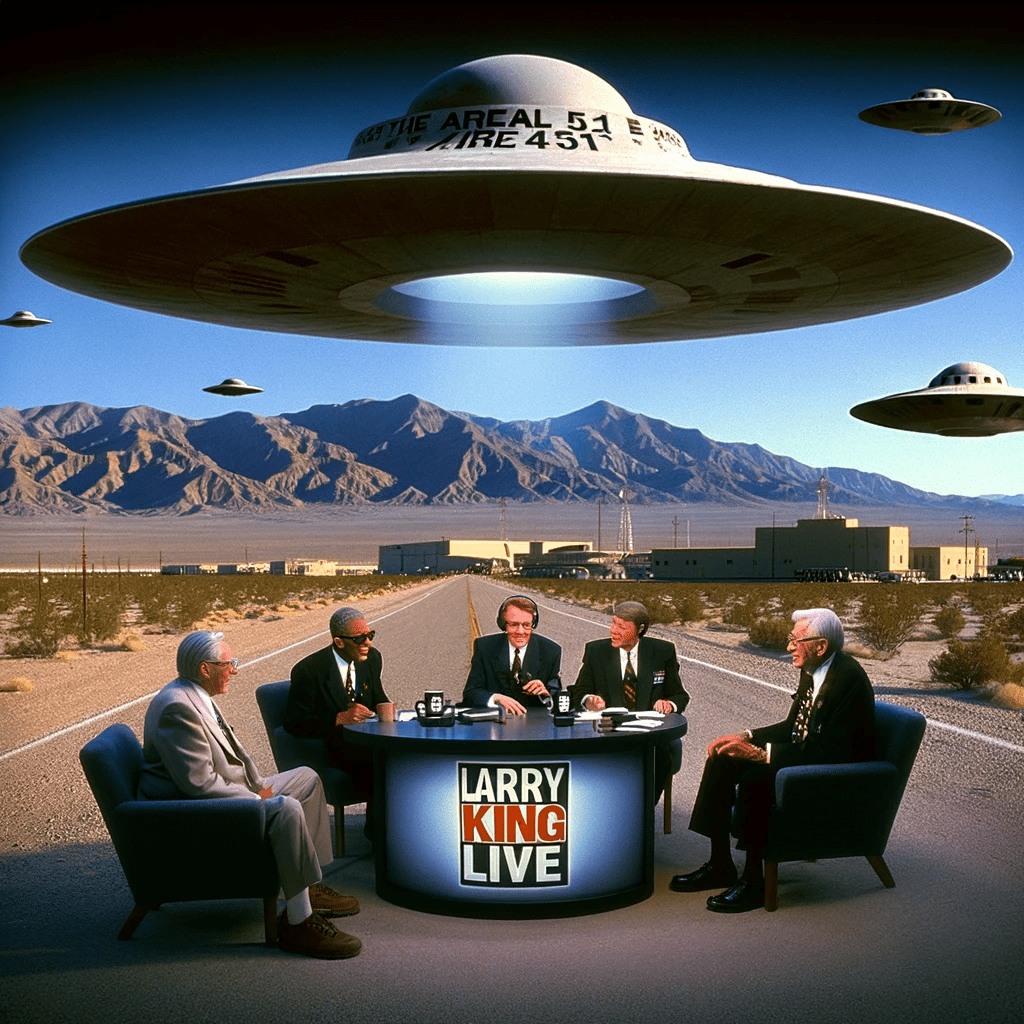Larry King: The UFO Cover-Up? Live from Area 51 (1994)

In a bold move that pushed the boundaries of mainstream media, Larry King’s “The UFO Cover-Up? Live from Area 51,” aired on October 1, 1994, marked a significant moment in television history. This two-hour special looked deeply into the world of Unidentified Flying Objects (UFOs) and the alleged government secrecy surrounding them.
Broadcast live from Rachel, Nevada, in the vicinity of the infamous Area 51, the show tapped into the era’s heightened public interest in UFOs. This period, marked by mysterious sightings and fueled by the Roswell incident of 1947, set a compelling backdrop for a discussion that would challenge the status quo.
Larry King was joined by Dr. Steven M. Greer, Stanton Friedman, Glenn Campbell, and Captain Kevin Randle.
Dr. Greer, a prominent figure in UFO research, shared his belief in the existence of at least one extraterrestrial civilization and discussed his personal experiences with UFO sightings, including close encounters and attempted communications through light signaling. He emphasized the non-hostile nature of these encounters and the importance of establishing diplomatic relations with extraterrestrial beings.
Nuclear physicist Stanton Friedman offered a perspective grounded in his extensive research, asserting the overwhelming evidence of Earth’s visitation by extraterrestrial spacecraft. He criticized the debunking efforts by notable figures like Carl Sagan and Philip Klass for ignoring relevant evidence and maintained the importance of distinguishing between most UFOs, which are not alien spacecraft, and the few that might be. Friedman also looked into the concept of a “cosmic Watergate,” a term he used to describe the government’s alleged cover-up of UFO information. He suggested that the secrecy could be driven by technological, national security, and economic concerns.
Glenn Campbell, an activist and researcher focused on Area 51, shared insights into the military base’s secretive nature. He highlighted the extensive security measures in place, including motion sensors and threats of deadly force, fostering an environment of fear and secrecy among employees and the public. Campbell remained open to the possibility of alien technology at Area 51 but emphasized that much of the activity there likely pertains to conventional military testing.
Captain Kevin Randle brought a military perspective to the discussion, focusing on the Roswell incident of 1947. He expressed firm belief in the crash of an alien spacecraft and the recovery of extraterrestrial bodies. Randle criticized the U.S. Air Force’s explanations of the event as a weather balloon and later as part of Project Mogul, a top-secret project involving high-altitude balloons.
In the “Larry King: The UFO Cover-Up? Live from Area 51” special, Barry Goldwater, the esteemed senator and presidential candidate, shared his perspectives on government knowledge of UFOs. Goldwater openly expressed his belief that the government possibly possessed undisclosed information about UFOs. He specifically referenced Wright-Patterson Air Force Base, suggesting it might be a repository for secret materials related to UFOs. Goldwater recounted an incident where he asked General Curtis LeMay for permission to access a secretive room at the base, believed to house UFO information. LeMay’s response was notably angry and dismissive, instructing Goldwater never to broach the subject again.
Goldwater’s contribution to the show was particularly impactful due to his high-profile status and long-standing interest in UFO phenomena. His personal anecdote about General LeMay and Wright-Patterson added a layer of intrigue to the ongoing discussion about government secrecy and UFOs on the Larry King special.
General Curtis LeMay was a prominent figure in the U.S. military, known for his role as the commander of the Strategic Air Command (SAC) during the Cold War and later as the Chief of Staff of the U.S. Air Force. His military career spanned World War II, the Korean War, and the early years of the Cold War, and he was recognized for his strategic acumen, particularly in the area of strategic bombing.
The SAC played a key role in America’s nuclear strategy. Any unidentified objects detected in U.S. airspace, especially those near strategic military installations, would have been of utmost concern to SAC and its leadership. As such, LeMay would have been involved in evaluating and responding to these incidents.
As a high-ranking officer in the Air Force and later as Chief of Staff, LeMay would have had access to a wide range of classified and sensitive information. This would likely include any military encounters with unidentified flying objects, which were of significant interest during the Cold War era due to concerns about Soviet technology and espionage.
Larry King’s “The UFO Cover-Up? Live from Area 51” remains a landmark in television history, providing a serious platform for discussing a topic often marginalized. As UFO topics gain more official recognition today, King’s broadcast stands as a pioneering effort in exploring one of humanity’s most enduring mysteries.


